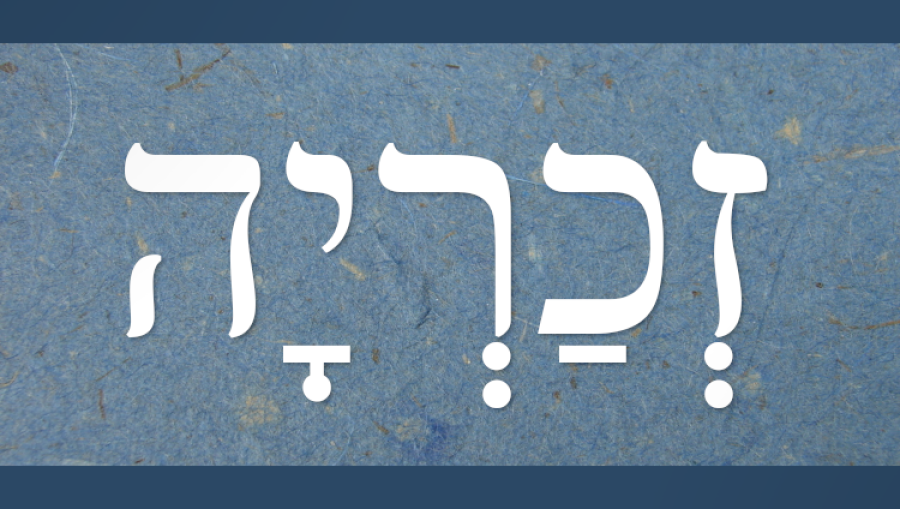Covenant Influences in Zechariah (Part 4)
Image

Read the series.
The Prophet as Actor and Two Covenants
In various parts of the Old Testament some of the prophets were ordered to act out a scenario as a pictorial revelation to onlookers. In 1 Kings 20:35f. a prophet asked a man to strike him so that he could act the part of a careless guard who had lost his prisoner in order to make his tale a parable of the king’s release of the Syrian Ben-Hadad. Isaiah was commanded to walk around virtually naked for three years as a sign that the Egyptians would be shamed by the Assyrians (Isa. 20). Jeremiah broke pottery at Hinnom (Jer. 19). Ezekiel was to enact a miniature siege against the ten tribes for 390 days, lying on his left side, and then do the same for 40 days on his right side laying siege against a portrayal of Judah (Ezek. 4). And of course Hosea married an unfaithful woman to dramatize Israel’s unfaithfulness to her Husband, Yahweh (Hos. 1 – 3). Each of these actions, and others besides, had predictive elements which were central to their message.
In chapter 11 of Zechariah’s prophecy he is instructed to portray two roles; one of a good shepherd, and one of an evil shepherd. In portraying the good shepherd Zechariah refers to two covenants, both of them rather obscurely, and sandwiched in-between are verses 12 and 13, wherein Yahweh Himself claims that He is to be priced at the same value as a gored slave (Exod. 21:32).1 As it stands, and even without knowing how this would be applied to Jesus (cf. Matt. 27:9-10), this is a shocking statement. Israel and Judah will be put at enmity by the Lord whom they despise, as signified by the breaking of the staff called “Bonds” or “Union” (Zech. 11:14), although this may still await eschatological fulfillment.2
But what of the first covenant symbolized by the staff called “Beauty” or “Favor” (Zech. 11:10)? Which covenant does God break with “all the peoples”? I have read many valiant attempts to answer the question, but I have not been convinced by any. Some like Baron make it an unofficial covenant of God to protect Israel from the nations, but this strains the words. I do not wish to add another unconvincing interpretation to the list. My guess is that it has something to do with the Abrahamic covenant, and there I am content to leave it.
The Worthless Shepherd
Another mystery is waiting for the reader before leaving Zechariah 11: who is the “worthless shepherd” of Zechariah 11:15-17? Some premillennial commentators believe it refers to the coming Antichrist. Some think it may be Antiochus IV Epiphanes, the bête noir of intertestamental Israel. We have seen that in Daniel 8 the description of the “little horn” fits Antiochus, but that the “little horn” in Daniel 7, who persecutes the saints just before the coming of the great King, is the end time persecutor of Israel. His cruel treatment of the people calls forth an imprecation,
A sword shall be against his arm and against his right eye; his arm shall completely wither, and his right eye shall be totally blinded. (Zechariah 11:17)
As several interpreters have noted, the force of the curse here is very adamant. Many make tentative association with the one whom Christians will call the Antichrist (and I believe the language calls for such an identification). If this is the “little horn” of Daniel 7, then it is possible that the covenant which God breaks in Zechariah 11:10 is the protection afforded by the Abrahamic covenant during the coming “time of Jacob’s trouble” (Jer. 30:6); the period portrayed by Christ as having to be curtailed lest even the elect be destroyed (Matt. 24:21-22. Cf. Dan. 12:1). Possible, but not certain. The description of injuries to the right arm and right eye are for identification purposes. They are not metaphorical, standing for an inability to function anymore as a shepherd, for this person didn’t do that anyway; he is worthless. If the injuries are a means of telling who this is, the only personage it can be biblically is the “little horn” (Dan. 7:24-26).
Notes
1 It must be remembered that this estimate was ancient in Zechariah’s day. Since wages are expressly mentioned, it is perhaps better to view it as an insulting valuation. See Kenneth G. Hogland & John H. Walton, “Zechariah,” in ZIBBC, John H. Walton, Gen. Ed., Vol. 5, 223.
2 We do know, for example, that the twelve tribes will be identifiable in Revelation 7, although I am suggesting a schism beyond those representatives who are seale.
Paul Henebury Bio
Paul Martin Henebury is a native of Manchester, England and a graduate of London Theological Seminary and Tyndale Theological Seminary (MDiv, PhD). He has been a Church-planter, pastor and a professor of Systematic Theology and Apologetics. He was also editor of the Conservative Theological Journal (later Journal of Dispensational Theology). He is now the President of Telos School of Theology.
- 59 views
I have always understood this judgment as coming just before the antichrist is cast into the lake of fire.
I also took it as a curse, not something that would actually happen while he was in power.
I recently heard someone explain this as an identifying marker of the antichrist.
Do you agree with me that this judgment comes (if not at the end) later in his career?
I know this is speculation.
"The Midrash Detective"
My guess is that it has something to do with the fatal wound he gets in Rev. 13. He rises from the dead, and all the world wonders at him (and sympathizes with his scars), but in truth I don’t know!
Dr. Paul Henebury
I am Founder of Telos Ministries, and Senior Pastor at Agape Bible Church in N. Ca.




Discussion